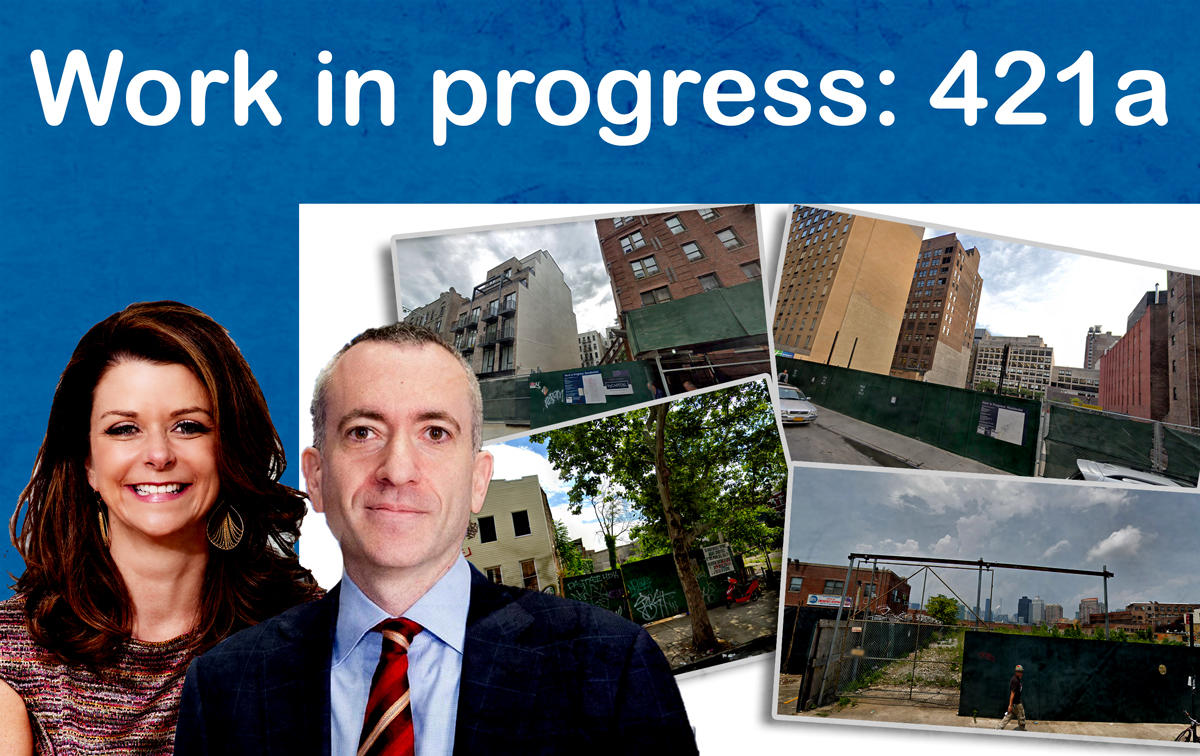Trending
For developers who love the old 421a, stalled construction sites are ripe for the picking
TRD analysis found 30 properties with permits but little-to-no progress

Four years ago, New York developers were on the verge of losing a privilege they had come to expect as a right: getting a steep discount on property taxes. The state’s “421a” tax exemption, which allowed condominium and rental builders to pay minuscule taxes for two decades as long as they invested in some affordable housing, was set to expire, and Gov. Andrew Cuomo and the state legislature did not provide a tremendous amount of confidence that it would be renewed.
So developers rushed—some of them prematurely—to get construction permits on land they owned, so the properties would qualify for 421a, should they decide to build on it. On just one day in June 2015, more than 1,600 units were permitted for construction in Brooklyn.
While many developers who obtained permits during this time eventually moved forward and completed construction, others did not, and those stalled development sites are now investment targets.
“I’m literally looking at projects that are six months from a [temporary certificate of occupancy], to sort of capitalize on a wave of guys who went out and said ‘421a is going away,’” said Matthew Messinger, CEO of Trinity Place Holdings, noting that some projects are struggling to finance the remainder of construction.
To identify the potential investments Messinger and others might be considering, The Real Deal analyzed permit filings between January and June of 2015 for projects with 10 units or more. We found at least 30 that are either incomplete or even have no considerable construction progress since that time.
Despite that, most of these projects still probably qualify for the pre-June 2015 version of 421a, which allows condominiums and typically requires fewer affordable housing units than the new iteration of 421a. As long as they began some construction work before July 2015, such as installing elements of the foundation and footings, the owners can still apply for 421a as it existed in that time, real estate lawyers told TRD.
“All you had to do was commence construction. There was no deadline to actually file an application,” said Jason Hershkowitz, a real estate estate attorney at the Seiden Schein firm.
Alvin Schein, of the same firm, said many older sites also qualify for the now expired tax certificate program, in which developers bought tax credits from affordable housing developers instead of building any affordable housing themselves. The dwindling number of projects eligible for the certificate program has driven down the price of outstanding certificates, Schein said.
Some developers have run into financial trouble since receiving their building permits in 2015.
For example, Brookland Capital purchased a site at 56 East 21st Street in Brooklyn in 2014 for $900,000, and filed a permit application for a 17-unit condo building that same year. But for the last five years, the property has sat vacant. In February, a group of Israeli bond investors sued Brookland to recoup the $2 million it invested in the project. The lawsuit notes that construction hasn’t even started, despite projections that it would be completed within two years.
The developer is in the process of reorganizing and selling off pieces of its portfolio, after admitting in November that it couldn’t meet a deadline to pay a portion of the $42 million it owes Israeli bondholders.
It’s not clear if the Flatbush site is among the properties Brookland plans to sell. Brookland’s Gilad Boaz didn’t respond to requests seeking comment.
Marc Schulman, managing principal of Icon Realty Capital, which is helping Brookland shed some of its properties, said the 21st Street site isn’t included in the portfolio it is overseeing. He said some owners of stalled condo projects are likely holding off on continuing construction because they plan to switch to rental or are waiting for the market to pick up. He said Icon is underwriting 30 or so condo projects that all have backup rental plans.
“Values, especially on some of the higher-ticket condo deals, have gone down. The absorption rates are just not what they were. Especially when you get up above $4 million, the average days on market are, I don’t know, probably 180-plus right now?” he said. He added that additional “red tape” under Affordable New York — the new version of 421a — would likely prevent owners from opting into the latest version of the tax program.
“Time is generally the root of all evil on deals. Usually getting to the finish line faster is what makes sense,” he said.
Many of the stalled sites, including Brookland’s, have been hit with stop-work orders from the city’s Department of Buildings, records show. In some cases, the orders were issued due to falling debris or unsafe conditions at the languishing sites. At 13 Patchen Avenue in Stuyvesant Heights, the DOB halted all construction on the site in October 2015 — only six months after the Paramount Homes Group filed plans for an 11-unit residential building on the site. The stop-work order was issued because a contractor whose registration was revoked worked on the site, according to agency records. The property has since been sold, in September 2018, to Moris Yeroshalmi for $1.5 million. The new owner hasn’t yet indicated what he plans for the site, and did not return a request for comment.
At least one major site with permits recently changed hands: Edison Properties’ 241 West 28th Street was leased to L&L Mag in December for more than $150 million. In 2015, Edison had the site permitted for a 460-unit residential project. A spokesperson for L&L declined to comment.
At sites where progress is virtually nonexistent, it’s sometimes intentional. At Two Trees’ ongoing Domino Sugar redevelopment, which will include roughly 2,300 units across several buildings, 280 and 350 Kent Avenue were permitted four years ago but have not been built, because Two Trees has been completing its project in phases. “280 and 350 are next in our queue, but it should be a couple of years,” Two Trees’ David Lombino told TRD.
In Greenpoint, Clipper Equity and Chetrit Group’s 720-unit rental development along Commercial Street had three buildings permitted in the spring of 2015, but the developers have also made little progress on completing the high rise buildings since that time. In an email, Clipper’s Bistricer said “the project is in full swing to be built as planned.”
Some other stalled sites are the result of investors who rushed into projects without having the proper experience or resources, Messinger said.
“There’s some guys who are not built for the gift that multifamily is through generations, who were, if anything, condo guys who were begging and borrowing for [partners],” he said. “I’m completely the white knight taking advantage of guys who have short-term IRR money, who are condo flippers who poured into Brooklyn and Queens and had the wrong capital structure and have had their heads in the sand.”




